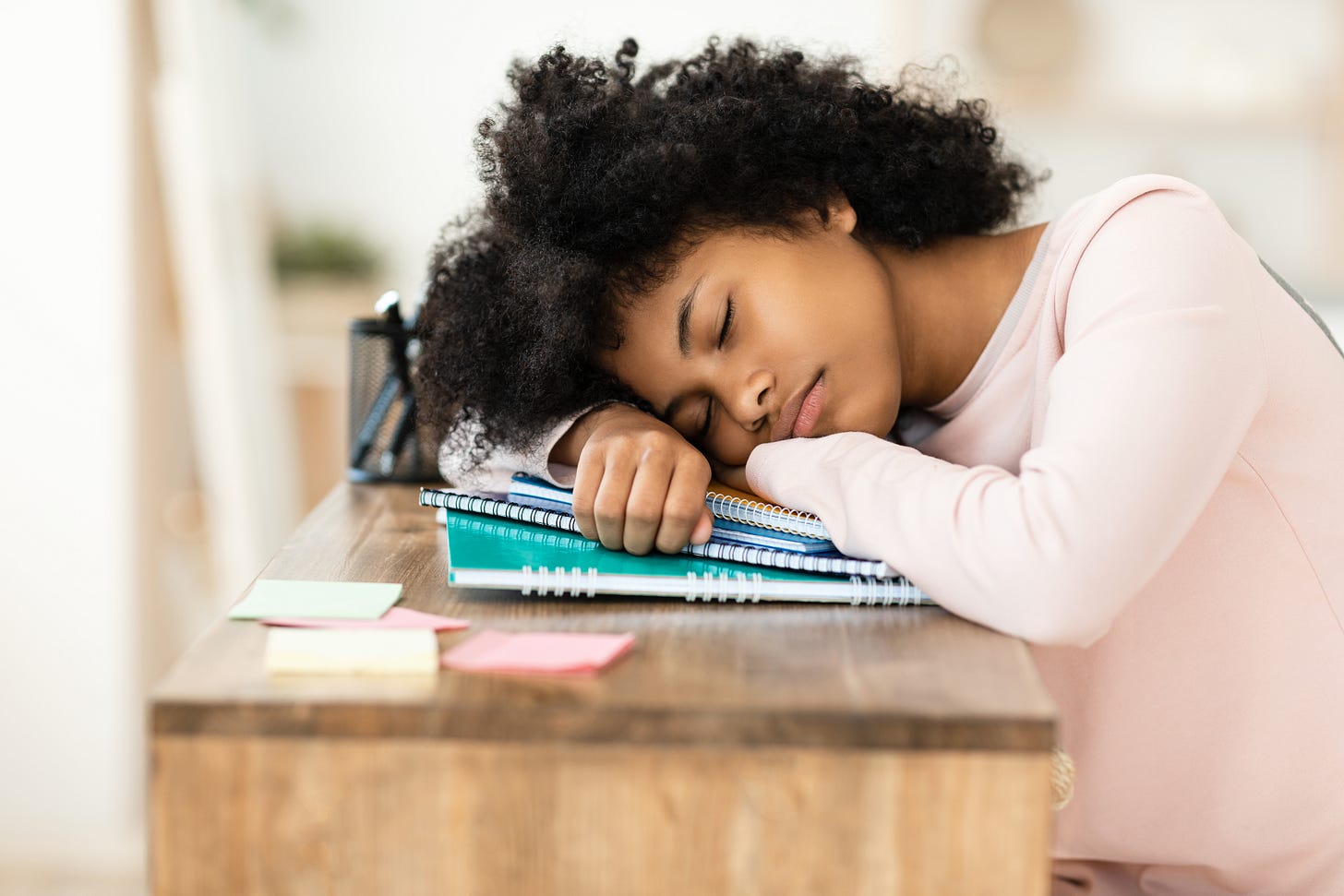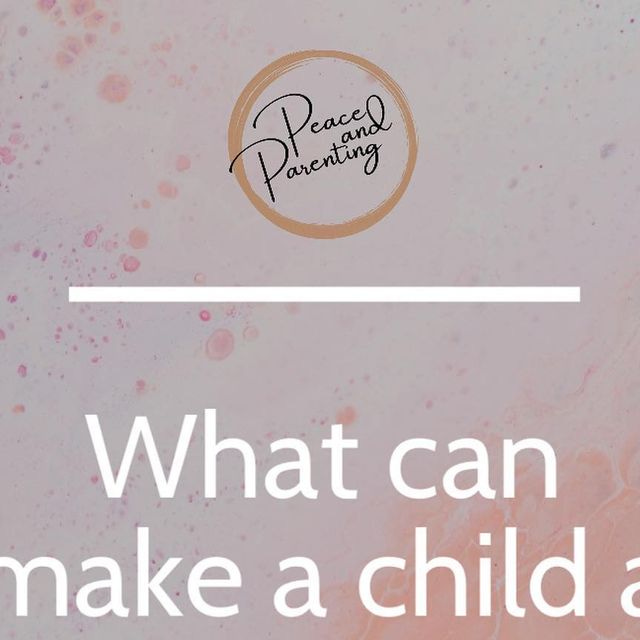"I'm So Tired."
How to help your kids get enough shut-eye.
First, I want to thank all of you for your support this week. I’ve gotten so many lovely comments here and on social media asking after my 8-year-old. She’s doing better; she’s back at school now, but the mono is very tiring and she’s having to take frequent rest breaks. Thankfully, she has an amazing teacher who is supporting her in the way that she needs. (But she is very, very sad about being forced to skip gym class and gymnastics.)
Today, I want to talk about tweens, teens and sleep. While I was at the Biennial conference for the Society for Research in Child Development last month, I shared an Instagram story about a session I attended titled “Pubertal Change, Deficient Sleep, and Mental Health Problems: Understanding This Slow Moving Trainwreck.” (That title though!) I then got a LOT of direct messages from parents who essentially said, “Please can you write about this and tell us what we can do? Please please please?”
So, here you go. (Also! If you don’t already, please follow me on Instagram!)
First, let me share a couple of eye-opening stats. Most kids in middle and high school aren’t getting enough sleep — only 22 percent of high schoolers were getting the recommended 8+ hours a night in 2019, according to the CDC — and sleep deprivation can be serious ramifications. When adolescents don’t sleep enough, they are at an increased risk for mental health problems and injuries; one study in Fairfax County, Virginia found that every hour of lost sleep in teens was linked to a 42% increase in suicidal thoughts and a 58% increase in suicide attempts.
At the conference presentation, I heard SUNY Brockport clinical psychologist and researcher Jack Peltz, who studies adolescent sleep, share some of his work. Afterwards, I reached out to him to see if he’d be willing to chat more with me about what parents can do to help their kids get the sleep they need. Today, I’m going to share six key (and surprising!) insights and suggestions he shared with me.
Know that kids’ body clocks change during puberty in ways that can make sleep elusive.
It might be tempting to assume that your kid’s complaints of “I’m so tired” reflect laziness, a lack of resilience, or a rebellious refusal to go to sleep when they should. But in fact, their shifting sleep schedules and morning exhaustion are not their fault.
When kids go through puberty, their internal clocks shift, causing them to feel awake into the wee hours of the night and sleepy throughout in the morning. Their natural clocks are out of sync with many middle and high school schedules, which often require students to be at school before 8am.
“Biologically, they want to go to bed later and wake up later. It's literally like teens in New York have moved to California in terms of their circadian rhythm,” Peltz explained to me. I can attest to this, as my sixth grader has a ton of trouble falling asleep and acts like a total zombie each morning when I drag him out of bed at 6am.
Now, let’s move onto what parents can do to help their kids get the sleep they need.
Talk to your kids about the importance of sleep, and collaborate on a healthy bedtime.
Peltz emphasized the importance of having open conversations with kids about the value of sleep. Be frank, he said, about the fact that the research strongly supports a link between a lack of sleep and mental health problems. Don’t make it a lecture; make it a discussion and listen to your kids’ concerns, too. You could say something like: “We love you, and we want you to be able to do all the things that you want to do. At the same time, sleep is really important and we need to make sure that you're getting enough of it.” Peltz’s research has found that when parents enforce a bedtime with adolescents, those kids sleep more and have a lower risk of depression symptoms.
Peltz said that ideally, you should agree on a bedtime that aligns with your child’s sleep needs and their body clock. Interestingly, while we don’t want our kids to go to sleep too late, we also don’t want them to go to sleep too early: If you force your child to go to bed each night before they’re sleepy, and they lie in bed for two hours, that can be counterproductive and actually cause more sleep problems over time. “You want them to know that there is a bedtime, and at the same time, that their bedtime is really honoring when they feel tired and are ready to go to bed,” he said.
Be careful how late you let your kids sleep on the weekends — and keep naps short.
I don’t know about your kids, but my tween looooooooves to sleep in on the weekends — which is a clear sign that he’s not getting enough sleep during the week. But while it’s tempting to let kids sleep in as much as they want on Saturday and Sunday, Peltz warned me that doing so could actually make it harder for them to sleep during the week — fueling a vicious cycle.
It’s fine to let kids sleep an hour or two later on the weekends, Peltz said, but parents should probably wake their kids up once that the two-hour mark has passed. Why? If you let your kid sleep until, say, 11am on Sunday, they probably aren’t going to fall asleep until quite late on Sunday night — and then they’ll wake up extra tired on Monday morning. Also, by allowing them have drastically different sleep schedules on weekends and weekdays, we prevent our kids’ bodies from learning — and adjusting to — a regular sleep schedule, which is important for ensuring consistent sleep. (Also, as an aside, research suggests that weekend sleep doesn’t entirely “make up” for weekday sleep loss anyway.)
Peltz warned against long naps, too:
Part of the biological change in the teen years is that they tend to have more of a dip in alertness in the afternoons. So they are more predisposed to an afternoon nap. But I would say napping longer than half an hour is most likely going to impair their getting to sleep that night. A nap is great for getting some alertness back, but if it goes past much past half an hour, you're getting into deep sleep, and waking somebody up out of really deep slow wave sleep is is very hard. And they tend to be very groggy and disoriented when it happens. And then if we let them sleep through a whole cycle — that 90 to 100 minute cycle — then they've probably decreased their sleep need enough that they're not going to want to go to bed at a reasonable hour that night. So — if they do go for a nap, the shorter the better.
Turn devices off one to two hours before bedtime (and have kids charge their devices outside their rooms at night).
You may have seen the “no devices before bed” advice before, but I hadn’t realized that the tech-free wind-down should ideally start one to two hours before bedtime. Blue light blockers won’t necessarily solve the problem: Peltz said the blue light emitted by devices, which is thought to reduce melatonin production and promote wakefulness, may not be as important as other aspects of device use, such as how emotionally stimulating it is.
“Is the text they got about so-and-so hooking up with so-and-so causing an emotional reaction? That emotional reaction is probably causing more of a disturbance to their sleep than the light they're getting from the screen,” he explained. “You can say the same thing about a video game that's physiologically arousing.” So if your kid is using a device before bed, at least try to ensure it’s not something that will upset or excite them.
Advocate for later school start times.
Last year, a new law went into effect in California requiring that public high schools start no earlier than 8:30 in the morning and that all public middle schools start no earlier than 8am. The law was driven by a growing body of research suggesting that kids fare better in all sorts of ways when schools start later (again because of that shift in the biological clock).
On the heels of the new California mandate, many other state legislatures are considering laws to push their school start times later, too. Some schools are delaying their start times even without state mandates. If you’re interested in advocating for later school start times in your state or district, consider starting a local chapter of the nonprofit Start School Later or reach out to your local politicians and school administrators; at the very least, check out these helpful online resources.
Model good sleep habits yourself.
Kids do as we do, not as we say — so modeling good sleep habits is crucial. Do your adolescents see you prioritize your sleep and put your devices away before bedtime? Do you talk about the importance of fulfilling your own sleep needs? Make it a goal to show your kids what proper sleep hygiene looks like. If you’re the kind of parent who’s always burning the midnight oil, your kid may start to think sleep is optional for them, too.
Related posts:
And now it’s time for this week’s Parenting Advice Hot Take!
Today, I’m commenting on this Instagram post from PeaceAndParenting, which has more than 1200 likes:
Here are my thoughts.





